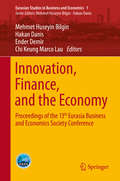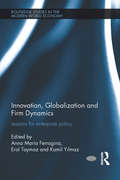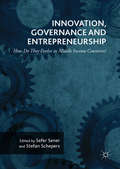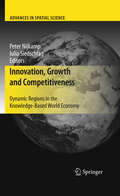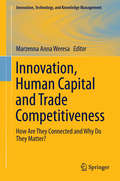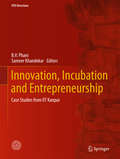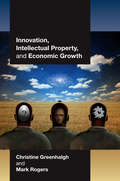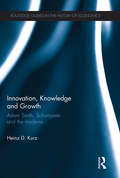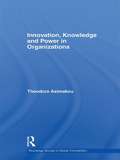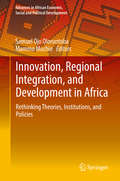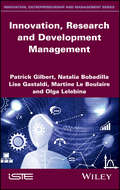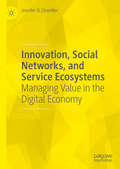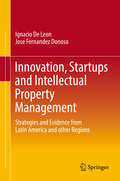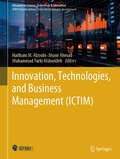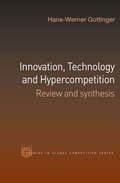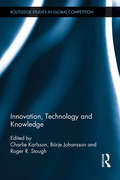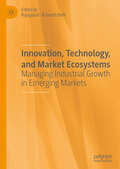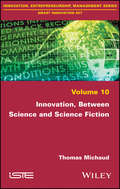- Table View
- List View
Innovation, Finance, and the Economy
by Mehmet Huseyin Bilgin Hakan Danis Ender Demir Chi Keung Marco LauThe first volume of the Eurasian Studies in Business and Economics, the official proceedings series of the Eurasia Business and Economics Society (EBES), includes selected papers from the 13th EBES Conference held in Istanbul in 2014. This volume covers theoretical and empirical contributions in the areas of innovation, entrepreneurship, HR, banking and finance. An eclectic set of methodologies and contributions from experts across the World makes this volume a valued work of reference. This volume also provides a timely opportunity to colleagues, professionals and students to catch up with the most recent studies in different fields and empirical findings on many countries and regions.
Innovation, Globalization and Firm Dynamics: Lessons for Enterprise Policy (Routledge Studies in the Modern World Economy)
by Anna Maria Ferragina Erol Taymaz Kamil YilmazThis book is about the relationship between firm dynamics, innovation and globalization, the processes that are essential for long term economic growth and welfare creation. This volume deals with these three issues in three sections titled respectively: entrepreneurship, new firm formation and growth; productivity-innovation-growthnexus; globalization, multinational firms and producers’ dynamics. The book presents new studies written by distinguished researchers in the field, who use state-of-the-art methodologies and extensive sources of firm- and plant-level longitudinal data to analyze and understand these major economic issues facing modern economies. In the first section, the book proposes two comprehensive introductory surveys which explore in detail the underpinnings of entrepreneurship, new firm formation and growth in advanced and developing countries. The second fundamental issue, productivity-innovation and firm dynamics, is approached by examining key drivers of selection mechanisms such as size, scale elasticity, innovative efforts, financial fragility of the firms, barriers to entry and exit, capital and financial market distortions, institutional inefficiencies and other market imperfections which affect the ability of firms to expand or enter. The third section examines differences, linkages and intertwined evolution of foreign and domestic firms in their dynamics of survival and growth in different institutional contexts and periods. Each chapter includes a detailed discussion of the implications of the respective analyses for enterprise policy. In a concluding chapter the overall implications for enterprise policy of the analyses presented in the different chapters are drawn by the Editors. This approach ensures that the book is integrated around a coherent central theme in comprehensive framework. The book responds to a growing concern among scholars, professionals, and policy makers over the recent decades about firm ability to survive and compete in a context of increasing globalization and international competition. The approach adopted is both theoretical and empirical with consideration of paradigmatic case studies in Europe, Africa and Asia, providing new evidence on developed, developing and transition economies in a comparative perspective. The cases selected represent different levels of development, different firms strategies and paths, with distinct outcomes. The book is an essential reading for scholars and students concerned with industry development, public policy and globalization, as well as to all those involved professionally in such issues.
Innovation, Governance and Entrepreneurship: How Do They Evolve in Middle Income Countries?
by Stefan Schepers Sefer ŞenerThis book analyses the effects of technological development, innovation, entrepreneurship and governance in middle income countries, such as Turkey, in detail. How to best practise innovation and entrepreneurship, which many researchers and policy makers believe to be the main drivers of economic growth and development, has become a fiercely-debated topic. The contributors to this volume consider economic, social and institutional dimensions of innovative thinking, entrepreneurial activity and governance, and investigate both theoretically and empirically how these factors should contribute to the uptake of new technology and the global performance of middle income countries. By offering country specific examples, and by comparing high income and middle income countries, this edited collection presents a comprehensive analysis of innovation, entrepreneurial growth and development outside the vacuum of high income economies, which has traditionally received substantially more scholarly attention.
Innovation, Growth and Competitiveness
by Peter Nijkamp Iulia SiedschlagThis book investigates dynamic regions in the context of greater global interaction in a world economy increasingly driven by knowledge and innovation. It offers novel empirical evidence on the underlying factors of the growth performance of these spaces. In particular, the following questions are addressed: What role is there for research, education and innovation in the development strategies of the dynamic growth regions? What are the risks and consequences of dynamic growth on patterns of world growth and development, competitiveness, inequalities, and convergence? What development strategies should be promoted at national and international levels to promote a growing and more sustainable world economy? What are the implications of the emerging new competitors for Europe's competitiveness? Using an innovative, integrated framework of analysis, the contributions in this book combine a wide array of complex theoretical and methodological approaches.
Innovation, Human Capital and Trade Competitiveness
by Marzenna Anna WeresaThis work focuses on researching and establishing the importance of human capital and innovation as determinants of competitive advantages in international trade--in the context of rapidly evolving technological advancement, globalization, and economic integration. The processes that accompany the shift from industrial economics to a knowledge-based economy are currently the object of interest of both scientists, politicians, investors and entrepreneurs. In many countries, the traditional sources of socioeconomic development, such as low labor costs, availability of inexpensive raw materials, and favorable geographic location are waning. These economies are searching for new sources of competitive advantage that will allow for maintaining growth, among other things by boosting participation in international trade. The book explores non-traditional drivers of competitiveness in both theory and practice. First, chapters 1 through 4 present theoretical and methodological aspects of the relationships among international trade, human capital and innovation. Here the authors address the controversy associated with the concept of competitiveness itself and its measurement, while paying special attention to the political development of comparative advantages related to international trade. The second part of the monograph, chapters 5 through 8, is of empirical nature. This section contains case studies of selected countries that represent models of various national innovation systems. Finally, the theoretical and practical aspects are integrated, allowing policymakers and financial and business leaders to consider how their decisions can influence their countries' competitive positions through their investments in innovation and human capital.
Innovation, Incubation and Entrepreneurship
by Sameer Khandekar B. V. PhaniThis book focuses on promoting entrepreneurial ecosystems within universities and educational institutes. It especially emphasizes the thriving systems and practices existing within the Indian Institute of Technology Kanpur (IITK). It discusses cases and successes of the SIDBI Incubation and Innovation Centre in the Institute. This edited volume highlights the vision of IITK and describes a few of the major achievements of the past few years. It especially showcases the requirements and challenges of creating, sustaining, and boosting such entrepreneurial ecosystems and incubation centres. The contents of this book will be useful to researchers, administrators, and corporate collaborators working in the area of monetizing technology coming from educational institutions by converting it to successful products and business ideas.
Innovation, Innovators and Business: Arab World Edition
by Alexandrina Maria PauceanuThis textbook approaches innovation and innovators as two elements of an equation with business application. It discusses creativity, methods to develop creativity, design thinking, the lean startup and minimum viable product (MVP), personal development for entrepreneurs, charisma, franchising and cases from the UAE. It is designed to be a practical and up-to-date resource for an innovation and entrepreneurship course. It contains practical information about the innovation frameworks and their applicability, explanation of creativity and creative mindset, methods of innovation, design thinking in practice, lean startup methodology, charisma, setting up a business, go-to-market strategies, growth and change as well as franchise management. It comes with worksheets to help the reader in practicing. The book solves the need of having innovation resources in one place, well explained and exemplified for students, aspirant and existing entrepreneurs as well as innovation enthusiasts.
Innovation, Intellectual Property, and Economic Growth
by Mark Rogers Christine GreenhalghWhat drives innovation? How does it contribute to the growth of firms, industries, and economies? And do intellectual property rights help or hurt innovation and growth? Uniquely combining microeconomics, macroeconomics, and theory with empirical analysis drawn from the United States and Europe, this book introduces graduate students and advanced undergraduates to the complex process of innovation. By addressing all the major dimensions of innovation in a single text, Christine Greenhalgh and Mark Rogers are able to show how outcomes at the microlevel feed through to the macro-outcomes that in turn determine personal incomes and job opportunities. In four sections, this textbook comprehensively addresses the nature of innovation and intellectual property, the microeconomics and macroeconomics of innovation, and economic policy at the firm and macroeconomic levels. Among the topics fully explored are the role of intellectual property in creating incentives to innovate; the social returns of innovation; the creation and destruction of jobs by innovation; whether more or fewer intellectual property rights would give firms better incentives to innovate; and the contentious issues surrounding international treaties on intellectual property. Clearly organized and highly readable, the book is designed to be accessible to readers without advanced economics backgrounds. Most technical materials appear in boxed inserts and appendixes, and numerous graphs and tables elucidate abstract concepts. Provides a comprehensive overview of the economic causes and effects of innovation Covers microeconomics, macroeconomics, theoretical and empirical analysis, and policy Includes up-to-date coverage of trends and policy in intellectual property and research and development Features mathematics appendix and keywords and questions to assist learning and teaching Outline lecture slides are available online
Innovation, Intellectual Property, and Economic Growth
by Mark Rogers Christine GreenhalghWhat drives innovation? How does it contribute to the growth of firms, industries, and economies? And do intellectual property rights help or hurt innovation and growth? Uniquely combining microeconomics, macroeconomics, and theory with empirical analysis drawn from the United States and Europe, this book introduces graduate students and advanced undergraduates to the complex process of innovation. By addressing all the major dimensions of innovation in a single text, Christine Greenhalgh and Mark Rogers are able to show how outcomes at the microlevel feed through to the macro-outcomes that in turn determine personal incomes and job opportunities. In four sections, this textbook comprehensively addresses the nature of innovation and intellectual property, the microeconomics and macroeconomics of innovation, and economic policy at the firm and macroeconomic levels. Among the topics fully explored are the role of intellectual property in creating incentives to innovate; the social returns of innovation; the creation and destruction of jobs by innovation; whether more or fewer intellectual property rights would give firms better incentives to innovate; and the contentious issues surrounding international treaties on intellectual property. Clearly organized and highly readable, the book is designed to be accessible to readers without advanced economics backgrounds. Most technical materials appear in boxed inserts and appendixes, and numerous graphs and tables elucidate abstract concepts. Provides a comprehensive overview of the economic causes and effects of innovation Covers microeconomics, macroeconomics, theoretical and empirical analysis, and policy Includes up-to-date coverage of trends and policy in intellectual property and research and development Features mathematics appendix and keywords and questions to assist learning and teaching Outline lecture slides are available online
Innovation, Kanoon Aur Garibi: इनोवेशन, कानून और गरीबी
by Robert D. Cooter and Hans-Bernd Schaferकैसे कानून नवाचार (इनोवेशन), विकास, गरीबी पर असर डालते हैं और राष्ट्र गरीब व अमीर बनते हैं। कूटर व शेफर बताते हैं कि इनोवेटर की पूँजी की समस्याओं का हल भी बेहतर कानून कर सकते हैं, जिसे वे विश्वास की दोहरी समस्या कहते हैं तथा इसके समाधान सुझाते हैं। कानून व अर्थशास्त्र के संयुग्मित विचार विश्व की गहनतम समस्याओं के हल की समझ देते हैं। यह पुस्तक राष्ट्रों की गरीबी पर ही नहीं, वरन् उसके नागरिकों की विकास की आकांक्षाओं के लिए कानूनी व इनोवेटिव विचारों को ऊर्जा देती है। भारत में बेहतर कानूनी ढाँचागत व्यवस्था व नवाचार की ऊर्जा है। अतः यह पुस्तक भारतीय पाठकों के लिए उपयोगी सिद्ध होगी।
Innovation, Knowledge and Growth: Adam Smith, Schumpeter and the Moderns (Routledge Studies In The History Of Economics Ser. #104)
by Heinz D. KurzThis book deals with the prime movers of socio-economic development, innovations and technical change, their origins, forms and effects. It contains a set of closely related chapters, some of which have been previously published as papers in scholarly journals
Innovation, Knowledge and Power in Organizations (Routledge Studies in Global Competition)
by Theodora AsimakouThis book examines discourses of knowledge and innovation in post-industrial societies and knowledge-based organizations. The author investigates the value of knowledge and the question of innovation management in a fully commercial environment for a technology company. In contrast with most of the mainstream approaches to knowledge and innovation management this volume chooses as its starting point a critical examination of these assumptions before proceeding with further suggestions on how to manage knowledge. Using brand new empirical research, the author argues for the significance of addressing the political games and power struggles enacted in managing innovation processes, which result from the opportunity certain groups seek to acquire or extend their control over valuable resources. Again, in contrast to mainstream approaches that reduce power to the ability of individuals to negotiate in order to promote their ideas, the analysis adopts an extended view on power, and seeks to reveal the ambiguities and challenges of innovation management. This work will be of most interest to researchers and students of knowledge and innovation management, namely postgraduates and second degree students, as well as managers in knowledge-based organisations.
Innovation, Regional Development and the Life Sciences: Beyond clusters (Regions and Cities)
by Kean BirchThe life sciences is an industrial sector that covers the development of biological products and the use of biological processes in the production of goods, services and energy. This sector is frequently presented as a major opportunity for policy-makers to upgrade and renew regional economies, leading to social and economic development through support for high-tech innovation. Innovation, Regional Development and the Life Sciences analyses where innovation happens in the life sciences, why it happens in those places, and what this means for regional development policies and strategies. Focusing on the UK and Europe, its arguments are relevant to a variety of countries and regions pursuing high-tech innovation and development policies. The book’s theoretical approach incorporates diverse geographies (e.g. global, national and regional) and political-economic forces (e.g. discourses, governance and finance) in order to understand where innovation happens in the life sciences, where and how value circulates in the life sciences, and who captures the value produced in life sciences innovation. This book will be of interest to researchers, students and policy-makers dealing with regional/local economic development.
Innovation, Regional Integration, and Development in Africa: Rethinking Theories, Institutions, And Policies (Advances in African Economic, Social and Political Development)
by Samuel Ojo Oloruntoba Mammo MuchieThis edited volume discusses the role of innovation and regional integration in economic development in Africa. Over the past five decades, post-colonial African countries have struggled to break loose from the trap of poverty and underdevelopment through the adoption of various development strategies at regional, national, and continental levels. However, the results of both national and regional efforts at advancing development on the continent have been mixed. Although the importance of agglomeration and fusion of institutions have long been recognized as possible path to achieving economic development in Africa, the approach to regionalism has been unduly focused on market integration, while neglecting other dimensions such as social policy, mobility of labor, educational policy, biotechnology, regional legislation, manufacturing, innovation, and science and technology. This volume investigates the link between innovation, regional integration, and development in Africa, arguing that the immediate and long term development of Africa lies not just in the structural transformation of its economies but in the advancement of scientific and innovation capacities. The book is divided into four parts. Part I addresses the theoretical and conceptual underpinnings of innovation and regional integration in Africa. Part II presents case studies which examine how regional economic institutions are fostering innovation in Africa. Part III of the book deals with sectoral issues on innovation and integrated development in Africa. Part IV sets the future research on innovation, regional integration, and development in Africa. Combining theoretical analysis and a comparative, interdisciplinary approach, this volume is appropriate for researchers and students interested in economic development, political economy, African studies, international relations, agricultural science, and geography, as well as policymakers in regional economic communities and the African Union.
Innovation, Research and Development Management
by Patrick Gilbert Natalia Bobadilla Lise Gastaldi Martine Le Boulaire Olga LelebinaIn today’s business environment, as organizations constantly seek to growth and develop through the optimization of their innovative and creative potential, understanding the critical issues and management practices in R & D is essential. This book provides a critical revaluation of the state of the art issues and concepts in R&D management. The views expressed are those of leading French researchers and professionals in this field, fed by empirical studies in national and international firms.
Innovation, Social Networks, and Service Ecosystems: Managing Value in the Digital Economy
by Jennifer D. ChandlerThis book examines the ways in which value is created in the digital economy from a social networks and service ecosystems perspective. Focusing on innovation, this project explores analytics, Big Data, and privacy with respect to service management and value creation. It debunks these technology-centric buzzwords by relating cross-disciplinary research topics from seminal sociology, business, management, marketing, information systems, organizational, and technology theory under the common theme of plasticity, which is the ability of a system to take and retain form. A keen understanding of plasticity is the route to success in the digital economy. This book, aimed at academics, graduate students and practitioners in fields related to innovation, service research, and strategic management, offers a holistic perspective on innovation that is informed by scholarly research from multiple disciplines.
Innovation, Startups and Intellectual Property Management
by Ignacio De Leon Jose Fernandez DonosoThis book identifies the potential of intellectual property as a competitive asset for Latin American firms. The authors employ a cognitive approach that involves identifying why small firms are reluctant to register patents, resorting rather to alternative IP competitive strategies. This, in turn, results in the undercapitalization of intellectual assets, thus creating hurdles for the development of capital venture markets. Using new data gathered from highly innovative SMEs in Latin America and the Caribbean, the authors bring a fresh cognitive approach towards understanding the institutional role of intellectual property, and outline various new policy recommendations.
Innovation, Strategy and Risk in Construction: Turning Serendipity into Capability
by Martin LoosemoreInnovation, Strategy and Risk in Construction integrates insights from business and government leaders with contemporary research, to help built environment professionals turn serendipity to their own advantage by building greater innovative and adaptive capacity into their operations. Accessible and full of practical examples, the book argues that traditional business strategies which seek to systematise innovation and eliminate uncertainty need to be balanced with more flexible approaches which acknowledge and harness uncertainty. The missing key to innovation, it is argued, is to turn serendipity into capability. The author proposes a simple model which allows managers to tap into the increasingly dynamic and interconnected nature of the construction industry. Innovation does not occur in isolation within individual firms, but through collaboration. Each stakeholder in the construction industry has a responsibility to drive innovation, and this book will be key reading for consultants, contractors, subcontractors, suppliers and clients, as well as policy makers and all serious students of construction management.
Innovation, Sustainability and Management in Motorsports: The Case of Formula E
by Hans Erik Næss Anne Tjønndal“There’s probably no better sport than Formula E to present and study the science and practice of innovation within (motor)sport, and this book is a must read for those active within this fascinating area”.- Dr. Kristof de Mey, Sports Technology, Innovation & Business Developer at Ghent University, BelgiumThis open access book provides novel insights on management innovation and sustainability in motorsport. Utilizing the all-electric racing championship called Formula E as case, it draws upon data from multiple sources such as sustainability reports of Formula and its stakeholders, media data, podcasts and newspaper articles, partner publications, and social media outputs. It aims to generate a theoretical model that describes and explains the optimal conditions for innovation when it comes to enhancing a sport organisation's commercial product. Apart from its general transferability to sports research, this model enables further study of a motorsport phenomenon that has been hailed by media as the championship, which affirms money in sustainability. It has also been emphasized by sport researchers as a highly relevant case to study management innovation.This book will be interesting to academics working in sports management, knowledge management, innovation and sustainability.Hans Erik Næss (b. 1978) is an Associate Professor in Sport Management at Kristiania University College, Norway. He holds a PhD in sociology from the University of Oslo and is the author of several peer-reviewed articles and books on motorsports, including A History of Organizational Change: The case of Fédération Internationale de l’Automobile (FIA) 1945-2020.Anne Tjønndal (b. 1988) is an Associate Professor in Sociology of Sport at Nord University, Norway. She holds a PhD in sociology from Nord University and has published articles in high-quality international journals on topics like social innovation, gender and inclusion/exclusion in sport. Tjønndal is the Celia Brackenridge International Research Award winner for 2019.
Innovation, Sustainability, and Technological Megatrends in the Face of Uncertainties: Core Developments and Solutions (Future of Business and Finance)
by Abeba N. Turi Pooja LekhiThis edited book focuses on the multidimensional aspects of the technological megatrends shaping our global economic system's social, economic, and geopolitical order in the face of uncertainties. With continued shocks, economic downturns, socio-political crises, climate change, and waves of pandemics that pose an existential threat, technological forces have significant effects in defining our path. In this book, by focusing on recent innovations and technological megatrends, the authors assess the sustainability of such human developments in the face of uncertainty. The book analyses the core developments, and trending tech solutions that pause challenges and bring opportunities for businesses and the economies as our global economy emerges from the devastating economic downturn caused by the COVID-19 pandemic and beyond. The book appeals to professionals wanting to assess how technological developments and innovation will impact their areas, but also to researchers interested in the impact on businesses, industries and economies.
Innovation, Technologies, and Business Management (Advances in Science, Technology & Innovation)
by Muhammad Turki Alshurideh Haitham M. Alzoubi Munir AhmadThis insightful book delves into how technological innovations are reshaping industries and redefining business strategies. In today&’s paced world of advancements, it is crucial to grasp the intricate relationship, between innovation, technology, and business management. This book serves as readers guide to mastering this interplay. From the developments in IoT and blockchain to the evolving paradigms of FINTECH and digital marketing, this book provides an exploration of the technologies driving change and creating new opportunities. However, it is not about technology. This book also tackles the aspects of managing and growing a business in the digital age. Discover how to lead through times of change foster a culture of innovation and navigate considerations during transformation. With real-life case studies, expert viewpoints, and practical insights, this book becomes a resource, for business leaders, entrepreneurs, managers, and students. Whether readers aim to stay of industry trends or gain an understanding of the constantly evolving business landscape, this book unlocks the potential that innovation holds for businesses. Embrace what lies ahead and revolutionize your approach by delving into the wisdom and understanding contained within the contents of this literature.
Innovation, Technology and Hypercompetition: Review and Synthesis (Routledge Studies in Global Competition)
by Hans-Werner GottingerIn an increasingly technologically-led century the striking pattern emerging in firms’ innovative activities is their competition for a technological leadership position in situations best described as races. A 'race' is an interactive pattern characterized by firms constantly trying to get ahead of their rivals, or trying not to fall too far behind. In high technology industries, where customers are willing to pay a premium for advanced technology, leadership translates into increasing returns in the market through positive network externalities. Innovation, Technology and Hypercompetition synthesizes and unifies the various methodological approaches for the industry-specific analysis of fast changing competitive positions driven by relentless innovation (hypercompetition). Game-theoretic and agent-based tools are applied to competitive industries in various market settings and in a global context. Rivalry of this sort is seen to extend to the catching up and forging ahead of regions and nations. In this revealing volume, Hans-Werner Gottinger brings his expert eye to this issue and employs various tools from economic theory to attain this end. He provides the behavioural foundations for what is driving globalization, in this, a volume of interest to academic economists, legal experts, management consultants and practitioners alike.
Innovation, Technology and Knowledge: Knowledge, Technology And Internationalization (Routledge Studies In Global Competition Ser. #55)
by Charlie Karlsson Roger R. Stough Börje JohanssonIn the last four decades the developed economies have developed into veritable knowledge economies at the same time as more and more economies have entered the road to economic development. Typical for the developments during this time has been substantially increased investments in research and development (R&D) to generate new knowledge and new technologies and increased investments in diffusing existing knowledge by means of education and thereby raising the volume of human capital. However, many member states and regions within the EU are struggling with their economic development. This book explores the uneven patterns of development within the EU, discusses the relative effect of investments on innovation and productivity growth and looks at the mechanisms involved in economic development and policy.
Innovation, Technology, and Market Ecosystems: Managing Industrial Growth in Emerging Markets
by Rajagopal Ramesh BehlThis edited book brings together international insights for raising rich discussion on industrial growth in the twenty-first century with a focus on the Industry 4.0 drive in the global marketplace, which is driven by innovations, technology, and digital drives. It delineates multiple impacts on business-to-business, business-to-consumers, the global-local business imperatives, and on the national economy. The chapters critically analyze the convergence of technology, business practices, public policies, political ideologies, and consumer values for improving business performance in the context of Industry 4.0 developments. This contribution will enrich knowledge on contemporary business strategies towards automation and digitization process in manufacturing, services, and marketing organizations. The discussions across the chapters contemplate developing new visions and business perspectives to match with the changing priorities of industries in the emerging markets.
Innovation, between Science and Science Fiction
by Thomas MichaudFantasy and science fiction are both involved in the process of innovation in techno-scientific societies. Long regarded as a hindrance to rationality, and to science, science fiction has become the object of praise in recent decades. Innovative organizations use science fiction to stimulate the creativity of their teams, and more and more entrepreneurs are using its influence to develop innovation. Scientific practice relies in part on an imaginary dimension. The mapping of the technical imagination of science fiction has become an important strategic issue, as has its patentability. The conquest of space, the construction of cyberspace and virtual reality, biotechnologies and nanotechnologies are all at the center of futuristic fictions that participate in scientific speeches and discoveries.
